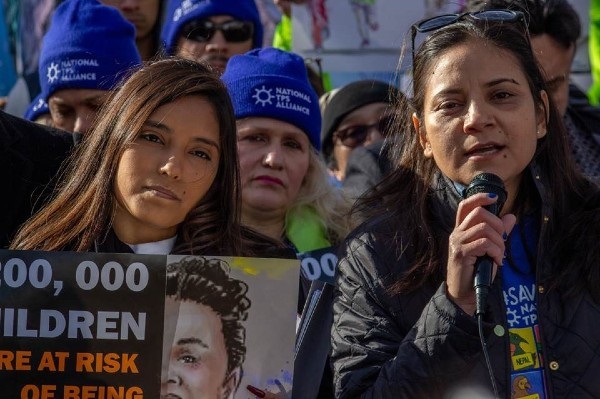
TPS holders, families, and allies at a rally in Washington in December 2019. Carl Roose / AFSC
Since taking office, President Trump has worked to end crucial protections for more than 300,000 immigrants from six countries with Temporary Protected Status (TPS). This life-saving program provides protection from deportation to people from certain countries afflicted by natural disasters, war, or other dangerous conditions—allowing them to live and work in the U.S.
Multiple lawsuits challenging these terminations have since been filed. On Sept. 15, 2020, the Ninth Circuit Court of Appeals issued a ruling that would clear the way for the administration to move forward with terminations for El Salvador, Haiti, Honduras, Nepal, Nicaragua, and Sudan. The decision leaves hundreds of thousands of TPS holders—many of whom have lived in the U.S. for decades—vulnerable to family separation and mass deportation.
Here’s what you need to know about what’s happening now with TPS.
1. There are multiple legal challenges to the Trump administration’s efforts to terminate TPS.
TPS holders, advocacy organizations, and other allies have been working to prove that the Trump administration was wrong—and discriminatory—in terminating TPS for impacted countries. Multiple lawsuits challenging the termination have been filed to stop their implementation. The suits also accuse the administration of ending TPS for certain countries based on racial discrimination and infringing on the constitutional rights of TPS holders, among other issues.
In a case known as Ramos v. Nielsen, plaintiffs (which include TPS holders and U.S. citizen children of TPS holders) claim that the decision to terminate TPS was based on a flawed reading of the law and driven by the administration’s racist, anti-immigrant, and white supremacist agenda. In October 2018, Ramos v. Nielsen—combined with another lawsuit, Bhattarai v. Nielsen—resulted in an injunction that prevented the removal of TPS holders from six countries (El Salvador, Haiti, Honduras, Nepal, Nicaragua, and Sudan).
2. In September 2020, the Ninth Circuit ruled against TPS holders and their children.
After an appeal by the Trump administration and hearing oral arguments, the court dismissed the claims made by TPS holders and their children—and lifted the injunction preventing the deportation of TPS holders.
In a 2-1 majority, the panel of judges ruled that the Department of Homeland Security (DHS) secretary is lawfully allowed to make decisions on TPS determinations—thus the courts do not have the authority to review those determinations. The ruling also implied that even though the president has made racist comments about TPS holders and was highly influential in the decision-making process to terminate TPS, there was not enough evidence that the terminations were racially motivated.
Read AFSC’s statement denouncing the decision.
3. There is limited time before the federal government can implement terminations for TPS and begin deportations.
However, the decision is not currently effective because the Ninth Circuit has not issued any directive to carry out the order. In the meantime, TPS holders continue to be protected and do not need to re-register to access these protections as they are automatically extended.
Based on agreements between the administration and the plaintiffs’ lawyers, the administration have extended protections from TPS holders to Oct. 4, 2021.
This year:
- TPS holders cannot face deportation.
- TPS holders can still get drivers’ licenses.
- TPS holders’ work authorizations are still valid.
In the event that Department of Homeland Security (DHS) is permitted to implement terminations, as early as October 2021, DHS can begin deporting TPS holders from Sudan, Nicaragua, El Salvador, and Haiti. Due to the combining of the Ramos v. Nielsen and Bhattarai v. Nielsen cases, the ruling could trigger the terminations for TPS holders from Honduras and Nepal, as well.
4. Legal challenges to the administration’s terminations of TPS continue.
Attorneys representing plaintiffs, including TPS holders and their U.S. citizen children, have appealed the Ninth Circuit ruling. This could kick off a series of events within the courts that would further delays terminations and the onset of enforcement actions. However, it is not guaranteed that the higher courts will hear the case or its appeals.
If the courts reject a request to appeal this week’s ruling by the Ninth Circuit, DHS could also terminate the automatic extension of protection it negotiated with plaintiffs’ attorneys.
TPS holders from Haiti are covered under other lawsuits making their way through the courts (including Saget v. Trump), which may affect their timeline.
5. Only legislation—not litigation—will provide a permanent solution to protect TPS holders, ensuring they can remain in the U.S. with their families and communities where they belong.
Litigation, while impactful, can only provide temporary relief for TPS holders, their families, and communities. Ultimately, only Congress can provide a permanent solution to protect TPS holders.
Without congressional action, the terminations of TPS will lead to devastating moral and economic consequences not just for TPS holders but for their families, communities, and for the entire country.”
Through organizing and advocacy, TPS recipients and their allies are counteracting the administration’s aggressive efforts to deport millions of people with deep roots in our communities.
Bills have been introduced in Congress that would protect TPS holders. The House has passed the Dream and Promise Act, which would offer a pathway to citizenship for people with TPS, Deferred Enforced Departure (DED), or Deferred Action for Childhood Arrivals (DACA). It’s time for the Senate to follow suit.